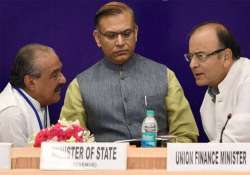Government considering clarificatory amendments to MAT rules: Jayant Sinha
The government is considering clarificatory amendments to the rules relating to Minimum Alternate Tax (MAT) for the benefit of foreign investors who have been battling tax demands worth Rs 40,000 crore.“Clarificatory amendments to MAT rules

The government is considering clarificatory amendments to the rules relating to Minimum Alternate Tax (MAT) for the benefit of foreign investors who have been battling tax demands worth Rs 40,000 crore.
“Clarificatory amendments to MAT rules are under consideration of the government,” Minister of State for Finance, Jayant Sinha, told reporters on the sidelines of a conference on climate change held here today.
Sinha, along with top government officials, had held meeting with Foreign Institutional Investors (FIIs) yesterday, pressing for government's Rs 40,000 crore tax demand, saying they should approach courts to get relief on these matters.
However, the government also made it clear that such demands would not apply to the entities from DTAA countries such as Singapore and Mauritius.
In case of investors from jurisdictions having Double Taxation Avoidance Agreements (DTAAs) with India, the treaty benefits would over-ride the tax demands.
The Revenue Department has already sent notices to FIIs, demanding 20 per cent MAT on capital gains made by them till March 31, 2015.
For all other foreign investors except those falling under DTAA, the only remedy left is to challenge the levy of 20 per cent MAT on capital gains they made in past three years.
Earlier speaking on ‘Climate Change Finance In India', Sinha said the private sector has to be a prime mover to help innovate and finance clean energy to mitigate environmental challenges.
“Even as we talk about what government is doing with respect to climate financing… the reality is that the private sector is going to be the prime mover and prime agent in actually helping us to deal with the financing of the climate amelioration technologies,” Sinha said.
He added that India really needs to look towards the private sector for large-scale solutions in this area.
“We have to think, in India how we can come up with innovative solutions, where domestic venture capital, domestic private equity, some kind of innovative financing arrangement with public sector support (can) make it possible for us to enable a very valuable solution to take off,” Sinha said.
Sinha said it is not possible for the government to work on climate change all by itself and it wants the private sector to step in.
“We really have to look to the private sector for large scale solutions that can help us scale up and which can get to every home, every village and every community in India and around the world.
“Otherwise, it's not going to be possible for government to do it by itself because we really need the private sector to step in,” he said.
And as the private sector steps in, we have to really make sure that the solutions that are developed for India, are developed in India by Indian innovators, Sinha added.
“We have to innovate in India, for India. And if we don't get the private sector to be innovative, we are not going to be able to scale it up, we are not going to be able to attract sufficient financing.
“We can't look to the public sector, we really have to look to the private sector for solutions,” Sinha said.
One of the very important initiatives that the government is undertaking and has communicated through the Budget is to really build up the entrepreneurial and innovation ecosystem in India, so that India can develop the solution that will be successful here, the Minister said.
Speaking at the same event, Chief Economic Adviser Arvind Subramanian said India needs to price coal (usage in the form of carbon credits) and go on a war footing to get clean technology as substitute for coal.
“We have to focus on really what are the key things that we need to avert climate change. I think a lot needs to be done in this regard,” Subramanian said.